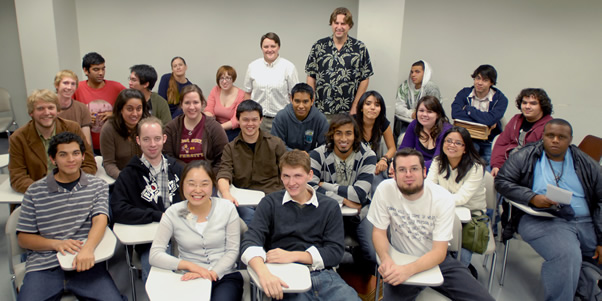Talk is Gold
Debate Team Focuses on Research, Preparation and Passion
January 13, 2009
By Valerie Orleans
“Remember, being a good person is part and parcel of being successful!”
Those are Jon Bruschke’s parting words to students as they head out of the classroom. As the coach of Cal State Fullerton's award-winning debate team, Bruschke, professor of human communication studies, has coached teams that have been victorious against the likes of Harvard, Berkeley, Northwestern and USC.
No Argument Here
Something you can’t argue: Bruschke, along with Toni Nielson, lecturer of human communication studies, have developed a team of top-notch debaters. Bruschke and Nielson themselves were award-winning CSUF debaters. Bruschke earned his bachelor's and master's degrees in speech communication from Cal State Fullerton before receiving his doctorate in communication from the University of Utah in 1994. Nielson earned her B.A. in speech communication from CSUF in 2002.
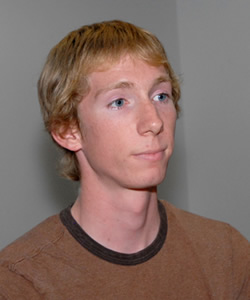
Eric Ruckman
"We accept anybody on our debate team as long as they're willing to put in the work," Bruschke said. "As a result, we have students with many different majors and backgrounds. The only thing we care about is our debaters’ passion and willingness to work hard.
“The Cal State Fullerton team always tries to say something socially significant, and we always try to connect the issues we are debating to the lives of actual people,” he added. “More than just being a successful debate team, we are a group of people striving to improve ourselves morally and intellectually. If we never won another round, I would be proud to be associated with this group.”
Champion Speaker
Eric Ruckman, the team’s only individual events speaker to place first in the spring championship, became interested in forensics as a student at Cypress College. Now a junior majoring in human communication studies (with an emphasis in intercultural communications), Ruckman hopes to go on to a career in local government.
“I’ve been involved in forensics for just over a year with a focus on impromptu speaking,” Ruckman said. “Forensics is a really great experience.”
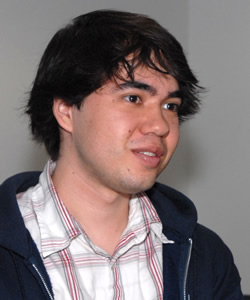
Bryce Bridge
Another team member, junior psychology major Bryce Bridge, is in the middle of his third year on the team.
“One of the reasons I applied to Cal State Fullerton is because of the debate team,” he said. “I enjoy the fact that debate engages people. And Fullerton has the type of squad I wanted — creative and inclusive.”
When team members arrive for a debate they are told whether they will be arguing the affirmative or negative position on their specific topic. (This year’s topic for competition nationwide is agricultural subsidies.) Debaters then make up a nine-minute speech on the spot. This requires them to be prepared to argue in favor of a position in one round. And, against it in the next. Usually, one team member researches the affirmative arguments and one the negative. However, both are expected to be able to take on either position.
Knowledgeable Talk
“You have to be knowledgeable about two different perspectives,” Bridge said. “You have to look at many different angles. The perspective can differ depending on social concerns, geography, economic status. And, they can all provide the foundations of a successful argument.”
Finishing her first semester on the novice team is junior human communication studies major Christen Trammell.
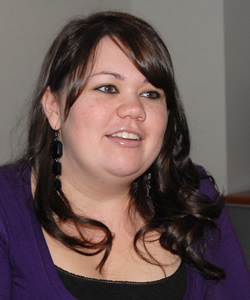
Christen Trammell
“I love it,” she said. “While agricultural subsidies were never something I thought much about, I find the research process very interesting. For instance, I’m focusing on sugar grown in the Dominican Republic. The United States helps fund the sugar harvesting, yet it is often done through the work of slave labor in the Dominican Republic. Should the United States really be funding this? You realize this isn’t just an agricultural issue but a human rights issue.”
Trammell credits the debate team with helping her organize her thoughts and develop her research skills.
“Clearly, I have to love this because it requires so much time,” she said. “I work full time, attend school full time and serve on the debate team. If I didn’t feel it was valuable, I wouldn’t make the time for the team.”
Most debaters estimate they spend more than 40 hours a week preparing for debate competitions.
The youngest member of the squad, freshman Marvin Carter, impressed his coaches enough that he is already a varsity member.
“It’s very unusual for someone as young as Marvin to be on the varsity team,” Bruschke said. “But, just watch him. He is going to be a star.”
When he was in third grade, Carter decided he wanted to be a politician. He became involved in forensics in junior high school and debate in high school. An athlete, he gave up his other teams (basketball, track and football) in his senior year so he could concentrate on debate.
“The pressure is always there with each win,” he said. “And the more wins, the higher you set the bar.”
Grounded and Well-rounded
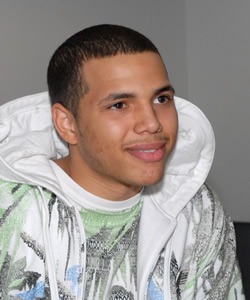
Marvin Carter
Carter believes debate helps him in other classes.
“You learn how to conduct extensive research and are always expanding your knowledge. This is much harder than high school but I like being pushed. However, I spend so much time in debate and developing arguments that I don’t like to argue outside of the team. You get tired of arguing,” he laughed.
Carter hopes to continue to debate throughout his university years.
“I hope to become a lobbyist or advocate for alternative energy,” he said. “Debate allows you to look at multiple sources to make a deeper connection. I want to take the skills I’ve learned and make positive changes for others.”
Debate fosters incredible research and speaking skills, Bruschke said. “You apply logic and passion to arguments. You learn to process information almost as quickly as you can hear it. You hear it, develop the counter argument, and then make the point. There are very few important moments when those skills aren’t essential.”


